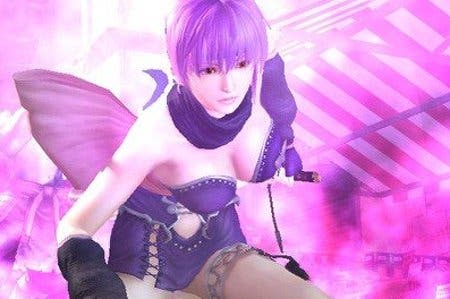Warriors Orochi 3 Review
Honour roll.
There are few games so widely misunderstood as those that shelter under Tecmo Koei's sprawling "Warriors" brand.
It certainly doesn't help that there seem to be roughly 12,000 of the things, drawn from what appear to be a dozen parallel franchises, all featuring the same chaotic battlefield action in which the player dashes around, mashing their joypad - and thousands of enemies to death - with relentless fighting strokes. Every few months there's another variation on the theme, and unless you're dedicated to the series it's all too easy to let them all merge into one vague mush of apparently one-note combat and indecipherable stories.
This misconception stems from one simple mistake: the assumption that these are fighting games. And, to be fair, once upon a time, they were. Look more closely, however, and you'll see that whether they're part of the Dynasty Warriors series set in Ancient China, the Samurai Warriors series set in feudal Japan, or the multitude of spin-offs set everywhere from Gundam's sci-fi universe to the siege of Troy, these are ultimately real-time strategy games. And sometimes, they're quite brilliant ones, allowing you to lay waste to hundreds of enemies using superhero powers while dictating and shaping the flow of a much larger war.
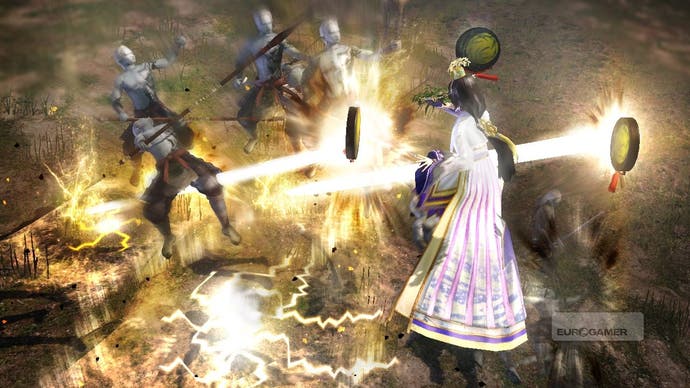
So while Warriors Orochi 3 may have blocks, counters and special moves just like its predecessors, the face-to-face combat remains an arcade hook to lure you into something far more interesting. The real gameplay comes as you read the battle map, pay attention to the information coming from across the field, consider your objectives and work out where you should lead your armies next. It's a rich, deep and dynamic combat experience hiding behind a frantic button-masher.
Not that you can really blame people for only seeing the latter as, like so many long-running cult series, Omega Force's games seem increasingly to speak only to their most devoted fans. Warriors Orochi 3 often acts like there's no such thing as a new player, assuming intimate knowledge of both characters and gameplay mechanisms and leaving little room for explanation.
For those newcomers willing to make the effort, here's the nutshell version. Warriors Orochi takes place in a crossover universe where characters from both Dynasty and Samurai Warriors fight side by side. At the start of this third entry, things are not going well. A demonic hydra is laying waste to the world and you're down to just three generals - series mainstays Takenaka Hanbei, Sima Zhao and Ma Chao - and even then, things go pear-shaped. Soundly defeated, you're given the chance to rewrite history by Kaguya, a moon princess from Japanese folklore. She sends you back in time to refight the critical battles that led to your defeat, allowing you to save all the generals needed to finally beat the hydra.
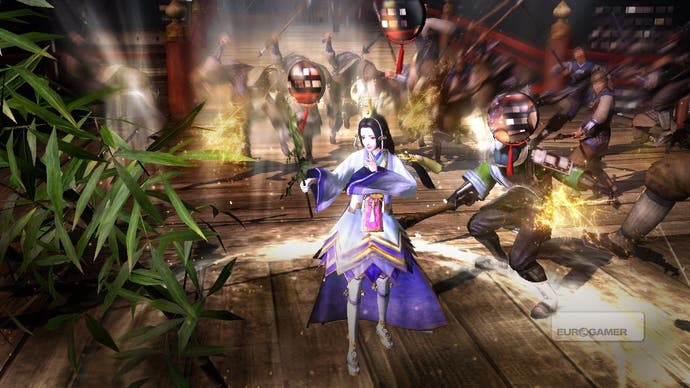
Certain key characters are still destined to die, however, unless you can find someone whose past holds the key to saving them. Recruit these people, talk to them in the game's hub area and new side missions are unlocked in previously completed battles, sending the story spider-webbing in different directions.
Clearly, despite many characters being based on historical warriors, realism isn't really on the cards, especially as the game also features crossovers within the crossover. Characters from other Tecmo Koei series also appear, such as Ninja Gaiden's Ryu and Ayane from Dead or Alive, as well as less familiar faces from Bladestorm and Trinity: Souls of Zill O'll. Historical figures such as Achilles and Joan of Arc also put in an appearance in case things were in danger of making any sense whatsoever.
There are beneficial changes to the gameplay, making the moment-by-moment fighting even more satisfying. As well as shaking up the move sets for pretty much every character, you're now able to make better use of your trio of chosen playable heroes. Switch Combos enable you to swap between characters in time with your attacks, chaining together moves that were previously kept separate. Characters can also be called in for support or, if the bond between them is strong enough, will jump in without being asked if they see their friend in danger. The True Union Arts combo, building on the Triple Attacks of old, unleashes furious three-way assaults on enemy forces, and brings a touch of Capcom-style tag team action into the mix. The longer you play, the more ways to pick and mix your team become available.
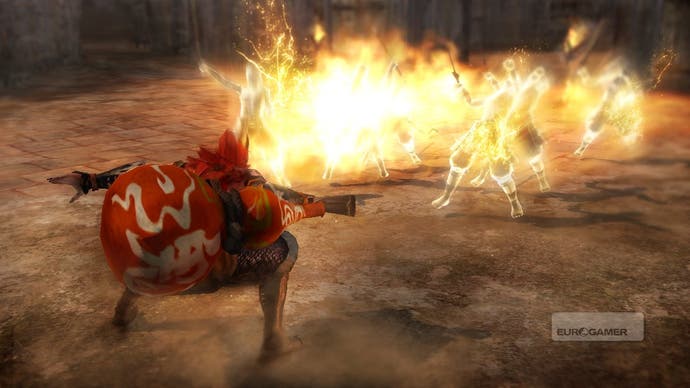
Not all the game's additions work quite as well, though. Musou Battlefields is a new feature that lets you customise the battles and share the results online, but it's a mistake to think of it as a level editor. The physical conditions of the map are set in stone, but what you can do is tinker with the enemy types, swap characters around, and even change the voices and music or add stringent time limits. You also add comedy squeaky sound effects, if you like. Once you prove the new mission can actually be beaten by playing it through yourself, you can upload it to the community.
The result is more remix than anything new, and as such will only really appeal to players so heavily invested that they can appreciate the changes wrought on the standard scenarios. It's a cute distraction, but barely scratches the surface of what should be possible with user-generated content in a game of this type. Hopefully it will continue to evolve in future sequels.
Elsewhere, Warriors Orochi 3 bears all the signs of a series that has grown so comfortable in its niche that basic evolution has slowed to a crawl. Online play remains stilted and limited, a throwback to the early days of PS2 connectivity rather than anything resembling modern multiplayer. Speaking to the Network Assistant in your camp allows you to join a quick match in one of the game's stages, or to request assistance in a story level that is giving you trouble, but it's a creaky, archaic affair, powered by opaque menus that too often spit back messages informing you there's nobody to play with.
Visually, as well, this is a game showing its vintage. Character models look like holdovers from the previous hardware generation while enemies and allies alike pop into existence mere feet away from where you're standing. Given the sheer number of characters on screen, it's no surprise that skins and animations become repetitive, but that doesn't excuse the jerkiness that often plagues the action, nor the awkward manual camera that lurches distractingly as you try to orient yourself. Though these dinosaur moments can irritate, they rarely impinge too disastrously on the game's appeal, which is resilient enough to survive the sometimes lumpen execution.
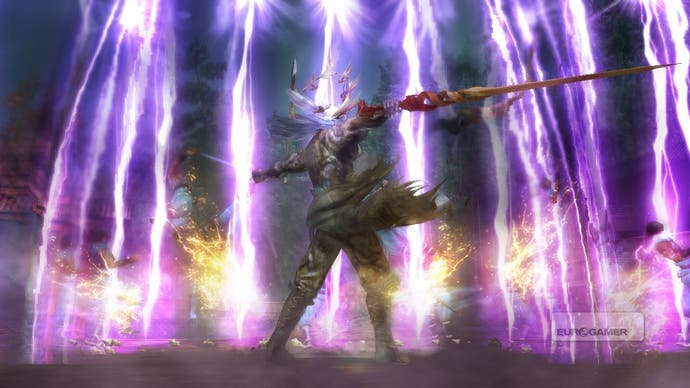
In many ways, Warriors Orochi 3 represents the best and worst of the series. Best, because it's a dizzyingly rich time-sink where manic arcade combat rubs seductively up against battlefield strategy and RPG progression with a sense of empowerment and excitement that is unique in video gaming. Charging into a throng of dozens of enemies, sending them all hurtling into the air, is a rush that never gets old.
But the game is also clearly being held back by an inability, or unwillingness, to broaden its audience. There's so much here that mainstream gamers should love, yet Tecmo Koei seems obstinate in its desire to keep the series as impenetrable to newcomers as possible, with too many of its better ideas only partially explained or else hidden away inside bland menus where only the converted will know to look.
This unhelpful attitude is neatly encapsulated by the decision this time around to completely ditch the English voiceover. Few would argue that the English-language acting in previous games was particularly good or well translated, but it did make it much easier to keep track of the shifting objectives during the frenzied gameplay. Now you need to keep an eye out for short-lived on-screen prompts and scour the tiny map for fuzzy markers in order to follow what's going on.
For fans, Warriors Orochi 3 refines the combat in exciting new ways, while the time-travel concept makes the battlefields even more dynamic and challenging. As such, for the faithful, it comes highly recommended. It's newcomers who should really consider giving this a try, though. Carve your way through the crude visuals, archaic menus and seemingly inexplicable features and you may just find your new favourite game.
